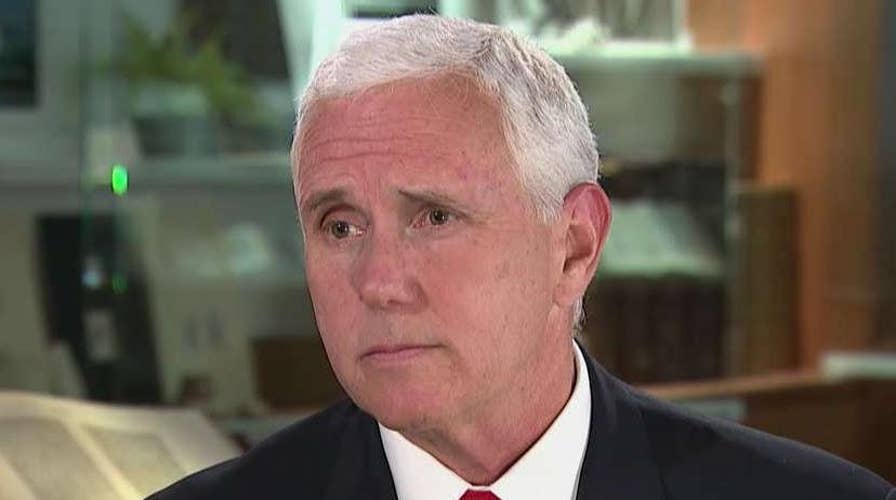Vice President Pence speaks out on defending religious liberty on 'Fox News @ Night'
Vice President Mike Pence sits down with Fox News' Shannon Bream to discuss attacks on religious freedom and his personal beliefs.
In his recent address to the 2019 graduates of Liberty University and again this week an interview with Shannon Bream of Fox News, Vice President Mike Pence raised the issue of religious liberty.
The vice president spoke of recent assaults on religious believers around the world – including attacks on the most fundamental of American rights here at home.
He explained that “throughout most of American history, it’s been pretty easy to call yourself Christian. It didn’t even occur to people that you might be shunned or ridiculed for defending the teachings of the Bible. But things are different now. Some of the loudest voices for tolerance today have little tolerance for traditional Christian beliefs.”
Pence’s remarks raise the question: What must Americans do to stem this tide of bigotry?
The answer may not be easy, but it is simple: We must return to a common understanding of the bedrock principles upon which our nation was founded.
The First Amendment prohibits government from establishing a state-preferred religion or prohibiting the free exercise of religious beliefs.
But we have allowed the interpretation of these phrases to stray so far from their clear intent that the mere presence of religious symbols in the public square are decried as unconstitutional, like the Bladensburg WWI Veterans Memorial in Maryland. The Supreme Court will soon render its decision on the constitutionality of the nearly 100-year-old memorial.
Free exercise of religion is too often referred to as the freedom of worship – which would confine religious freedom to the pews of our houses of worship or the minds of the faithful.
For example, in a recent New York Times opinion piece headlined “We Are Taking Religious Freedom Too Far,” Margaret Renkl wrote: “The Constitution protects the right to believe whatever I want to believe.”
There is nothing wrong with this analysis that doesn’t fit neatly into the word “everything.”
There is no other context in the history of the English language where the word “exercise” does not imply and require action. Only in this one instance so crucial to the American way of life does anyone attempt to equate exercise with belief.
If all that was required of me to have six pack abs was to believe in my mind and heart that I do, I would look more like the original Thor instead of the current "Endgame" version.
The results of this perversion of the free exercise clause are as tragic as they are predictable. People from all walks of life are faced with the impossible dilemma of choosing between their deepest convictions and their livelihood.
People like Washington State high school football coach Joe Kennedy, who was fired from his coaching job for kneeling at the 50-yard line after games for a 15-30 second silent prayer.
Or Melissa Klein, who lost her family business, Sweetcakes by Melissa, when she referred a same-sex couple to another bakery for their wedding cake. The State of Oregon imposed a $135,000 penalty essentially bankrupting her private business because the state disagreed with the beliefs of the owner.
My firm, First Liberty Institute is defending Kennedy, Klein, and the Bladensburg Memorial. However, the courtroom is the last line of defense. It is our culture that must be won to preserve our most cherished liberty.
There was once a phrase common in public debate, “I disagree with everything you say but I would die to defend your right to say it.” Sadly, that notion has disappeared from our common discourse and been replaced with, “I disagree with everything you say and therefore you shouldn’t be allowed to say it.”
CLICK HERE TO GET THE FOX NEWS APP
This is more than collective cognitive dissonance; this is an existential threat to the life of our republic.
The classic song “Me and Bobby McGee” includes the lyrics, “Freedom’s just another word for nothing left to lose.” As the Vice President has aptly illustrated, and current litigation demonstrates, without a return to the Founders’ vision of religious freedom we may soon discover the truth of those lyrics.

